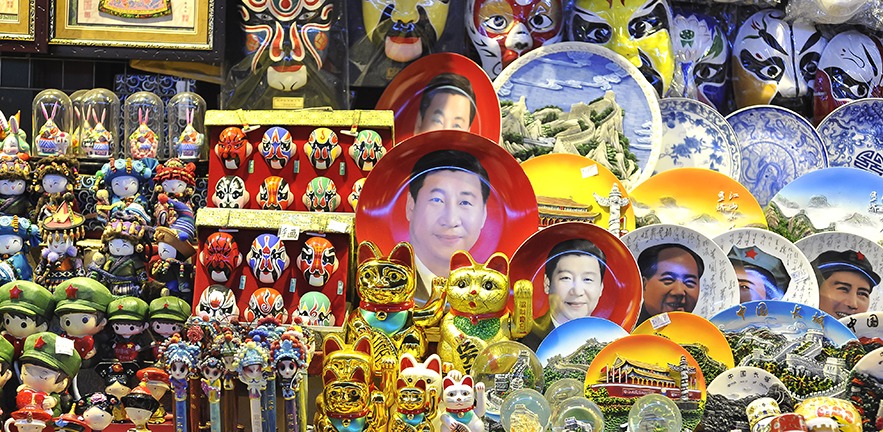In a series of articles written for top-level publications – Harvard Business Review, Foreign Policy magazine and Time magazine – Christopher Marquis of Cambridge Judge Business School sheds new light on China’s leader Xi Jinping as the 20th Party Congress of the Chinese Communist Party got under way in Beijing.
The Congress, in which Xi is expected to receive an unprecedented third term, began on 16 October and concludes on 22 October.
Christopher Marquis, Sinyi Professor of Chinese Management at Cambridge Judge Business School, is co-author of the book being published in November, Mao and Markets: The Communist Roots of Chinese Enterprise.
Rural markets are price-sensitive in China

In an article in Harvard Business Review, Chris says that many multinationals have struggled in China because they have focused on hotly contested Chinese cities rather than price-sensitive rural markets.
Whereas companies such as Best Buy and Walmart stumbled, semiconductor maker AMD made China its largest market by 2020.
“When AMD entered China in 2004, it focused on selling cheaper products to attract price-sensitive consumers in rural markets,” Chris writes. “In this way, it could avoid competing with Intel, then the market leader.”
He adds that, “consciously or not”, AMD was copying a strategy behind many of China’s current champions including e-commerce platform Pinduoduo, which attracted low-income consumers through low prices and “thus gained traction in a segment numbering hundreds of millions of customers”.
Xi is following the ‘playbook’ of Mao
Christopher notes that this strategy “also features in the playbook of Mao Zedong”, the founding father of Chinese communism, who first gained support for the Chinese Communist Party from peasants and farmers before attempting a move into the larger cities.
“Not a bad entry strategy for the CCP, as it turned out. And it obviously worked for AMD,” he says in the HBR article, entitled “The Chinese market is more than just its urban centers”.
In an article in Foreign Policy magazine, Chris focuses on how Xi is emulating Mao in industrial strategy – and predicts that it won’t end well.
China’s semiconductor strategy is flawed, says Christopher Marquis
In the article – entitled “Xi’s grand industrial ambitions are likely to flop” – Christopher says that Xi’s focus on making China a global leader in semiconductors, part of the Made in China 2025 programme, “seems like the 2020s version of Mao’s 1950s focus on steelmaking”. He concludes that this is “an ostensibly sensible development priority that will fail, as it is guided by an ineffective top-down campaign logic and lack of connection to economic reality.”
That’s because semiconductor expertise “is built across many different regions in the world, each with their own focus and comparative advantage that rests on decades of research and development”, Chris writes. “But the guiding logic of China’s semiconductor development differs substantially, aiming for self-sufficiency and shaped by political more than economic motivations—not least by the dominance of Taiwan’s semiconductor industry.”
“Cross-historical comparisons must always be taken with a grain of salt. But there is still much to be learned from the influence of Mao’s campaigns on Xi’s politics and governance – and they portend continued economic troubles for China and concomitantly more and more tension with the West,” the Foreign Policy article concludes.
Xi’s actions run counter to Western assumptions
In an article for Time magazine, Chris notes that Xi “imitates Mao on many occasions, including his gestures, dress, and rhetoric” – but that this connection has been “hard to see” for Western countries as it runs counter to our assumptions about China’s rise.
“For the last 40 years, we have assumed China was becoming more like ‘us’ – abandoning the shackles of communism, and adopting the ‘free’ market. Thus, Xi’s moves have been a surprise to many savvy observers of China, including top strategists in the White House,” he writes in the article entitled “What Xi Jinping draws from Mao’s legacy”.
Avoid knee-jerk condemnation of China for better understanding
“If we are to productively engage with China in the future, we need to understand the implications of these ideas on Chinese politics and daily life,” says Chris. “Instead of broad-brush ideological condemnation of China’s ambitious strategies and programs, the US should be more targeted in understanding them, and focus on its own development.
“As Xi moves into his third term, we need to examine Mao’s ideas and ideals for a more accurate perspective on how China will be governed in the future. Knee-jerk condemnation as a result of our own ideologically driven blind-spots will only lead to a misunderstanding of China and its ambitions.”


